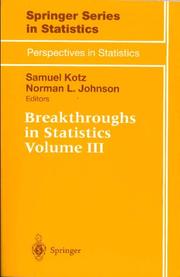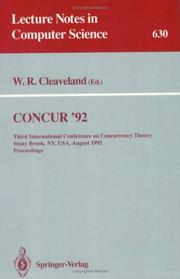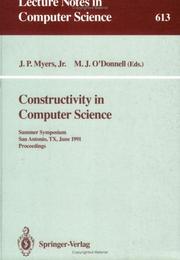| Listing 1 - 4 of 4 |
Sort by
|

ISBN: 0387949895 0387949887 1461206677 0387940375 0387940391 3540940375 0387975667 3540975667 3540940391 0387975721 3540975721 1461209196 1461243807 9780387949895 9780387940373 9780387940397 Year: 1992 Publisher: New York, N.Y. Springer
Abstract | Keywords | Export | Availability | Bookmark
 Loading...
Loading...Choose an application
- Reference Manager
- EndNote
- RefWorks (Direct export to RefWorks)
This is author-approved bcc: This is the third volume of a collection of seminal papers in the statistical sciences written during the past 110 years. These papers have each had an outstanding influence on the development of statistical theory and practice over the last century. Each paper is preceded by an introduction written by an authority in the field providing background information and assessing its influence. Volume III concerntrates on articles from the 1980's while including some earlier articles not included in Volume I and II. Samuel Kotz is Professor of Statistics in the College of Business and Management at the University of Maryland. Norman L. Johnson is Professor Emeritus of Statistics at the University of North Carolina. Also available: Breakthroughs in Statistics Volume I: Foundations and Basic Theory Samuel Kotz and Norman L. Johnson, Editors 1993. 631 pp. Softcover. ISBN 0-387-94037-5 Breakthroughs in Statistics Volume II: Methodology and Distribution Samuel Kotz and Norman L. Johnson, Editors 1993. 600 pp. Softcover. ISBN 0-387-94039-1.
Composition (Language arts) --- Language arts (Elementary) --- Reading (Elementary) --- Mathematical statistics --- Longitudinal studies --- -Reading (Elementary) --- -Composition (Language arts) --- -Mathematical statistics --- #PEDA *012.4 --- Mathematics --- Statistical inference --- Statistics, Mathematical --- Statistics --- Probabilities --- Sampling (Statistics) --- Composition (Rhetoric) --- Writing (Composition) --- Written composition --- Language arts --- Reading --- Statistical methods --- Study and teaching (Elementary) --- Study and teaching --- Engineering & Applied Sciences --- Applied Mathematics --- Mathematical statistics. --- Longitudinal studies. --- Statistique mathématique --- Statistique mathématique --- Applied mathematics. --- Engineering mathematics. --- Applications of Mathematics. --- Engineering --- Engineering analysis --- Mathematical analysis --- Composition (Language arts) - Longitudinal studies --- Language arts (Elementary) - Texas - Longitudinal studies --- Reading (Elementary) - Texas - Longitudinal studies

ISBN: 3540558225 0387558225 3540472932 Year: 1992 Volume: 630 Publisher: Berlin : Springer-Verlag,
Abstract | Keywords | Export | Availability | Bookmark
 Loading...
Loading...Choose an application
- Reference Manager
- EndNote
- RefWorks (Direct export to RefWorks)
This book contains a selection of research papers describing recent advancesin the theory of concurrent systems and their applications. The papers were all presented at the CONCUR '92 conference, which has emerged as the premiere conference on formal aspects of concurrency. The authors include such prominent researchers as R. Milner, A. Pnueli, N. Lynch, and V.R. Pratt. The results represent advances in the mathematical understanding of the behavior of concurrent systems: topics covered include process algebras, models of true concurrency, compositional verification techniques, temporal logic, verification case studies, models of probabilistic and real-time systems, models of systems with dynamic structure, and algorithms and decidability results for system analysis. A key feature of CONCUR is its breadth: in one volume it presents a snapshot of the state of the art in concurrency theory. Assuch, it is indispensible to researchers - and would-be researchers - in theformal analysis of concurrent systems.
Parallel processing (Electronic computers) --- Parallélisme (Informatique) --- Congresses --- Congrès --- -681.3*D13 --- 681.3*D32 --- 681.3*F12 --- 681.3*F3 --- Concurrent programming --- language classifications: applicative languages; data-flow languages; design languages; extensible languages; macro and assembly languages; nonprocedural languages; specialized application and very high-level languages (Programminglanguages) --- Modes of computation: alternation and nondeterminism; parallelism; probabilistic computation; relations among modes; relativized computation --- Logics and meanings of programs (Theory of computation) --- 681.3*F3 Logics and meanings of programs (Theory of computation) --- 681.3*F12 Modes of computation: alternation and nondeterminism; parallelism; probabilistic computation; relations among modes; relativized computation --- 681.3*D32 language classifications: applicative languages; data-flow languages; design languages; extensible languages; macro and assembly languages; nonprocedural languages; specialized application and very high-level languages (Programminglanguages) --- 681.3*D13 Concurrent programming --- Parallélisme (Informatique) --- Congrès --- Parallel processing (Computer science) --- Mathematics. --- Information theory. --- Logic design. --- Computer science. --- Applications of Mathematics. --- Theory of Computation. --- Logics and Meanings of Programs. --- Computation by Abstract Devices. --- Programming Languages, Compilers, Interpreters. --- Programming Techniques. --- Informatics --- Science --- Design, Logic --- Design of logic systems --- Digital electronics --- Electronic circuit design --- Logic circuits --- Machine theory --- Switching theory --- Communication theory --- Communication --- Cybernetics --- Math --- -Congresses

ISBN: 3540556311 0387556311 3540472657 Year: 1992 Volume: vol 613 Publisher: Berlin Springer
Abstract | Keywords | Export | Availability | Bookmark
 Loading...
Loading...Choose an application
- Reference Manager
- EndNote
- RefWorks (Direct export to RefWorks)
Mathematicians have long recognized the distinction between an argument showing that an interesting object exists and a procedure for actually constructing the object. Computer science adds a new dimension of interest in constructivity, since a computer program is a formal description of a constructive procedure that can be executed automatically. It has beenover a decade since a conference was devoted to constructivity, and never before has one been held specifically relating computer science to constructivity. Thus, this proceedings volume is the most concentrated offering ever produced of the diverse ways in which constructivity and computer science are related. The papers cover semantics and type theory, logic and theorem proving, real and complex analysis, topology and combinatorics, nonconstructive graph-theoretical techniques, and curriculum and pedagogic issues. The book offers a concentrated view of the many ways in which constructivity has assumed importance in computer science, and contains results available nowhere else.
Mathematical analysis --- Computer science --- -681.3*F32 --- 681.3*F33 --- 681.3*F41 --- 681.3*I23 --- Informatics --- Science --- Mathematics --- -Congresses --- Semantics of programming languages: algebraic approaches to semantics; denotational semantics; operational semantics (Logics and meanings of programs)--See also {681.3*D31} --- Studies of program constructs: control primitives; functional constructs; program and recursion schemes; type structure (Logics and meanings of programs)-- See also {681.3*D32}; {681.3*D33} --- Mathematical logic: computability theory; computational logic; lambda calculus; logic programming; mechanical theorem proving; model theory; proof theory;recursive function theory--See also {681.3*F11}; {681.3*I22}; {681.3*I23} --- Deduction and theorem proving: answer/reason extraction; reasoning; resolution; metatheory; mathematical induction; logic programming (Artificial intelligence) --- 681.3*I23 Deduction and theorem proving: answer/reason extraction; reasoning; resolution; metatheory; mathematical induction; logic programming (Artificial intelligence) --- 681.3*F41 Mathematical logic: computability theory; computational logic; lambda calculus; logic programming; mechanical theorem proving; model theory; proof theory;recursive function theory--See also {681.3*F11}; {681.3*I22}; {681.3*I23} --- 681.3*F33 Studies of program constructs: control primitives; functional constructs; program and recursion schemes; type structure (Logics and meanings of programs)-- See also {681.3*D32}; {681.3*D33} --- 681.3*F32 Semantics of programming languages: algebraic approaches to semantics; denotational semantics; operational semantics (Logics and meanings of programs)--See also {681.3*D31} --- 681.3*F32 --- Mathematics&delete& --- Congresses --- Computer science - Mathematics - Congresses. --- Information theory. --- Mathematics. --- Computer science. --- Artificial intelligence. --- Logic design. --- Theory of Computation. --- Applications of Mathematics. --- Mathematical Logic and Formal Languages. --- Artificial Intelligence. --- Logics and Meanings of Programs. --- Programming Languages, Compilers, Interpreters. --- Design, Logic --- Design of logic systems --- Digital electronics --- Electronic circuit design --- Logic circuits --- Machine theory --- Switching theory --- AI (Artificial intelligence) --- Artificial thinking --- Electronic brains --- Intellectronics --- Intelligence, Artificial --- Intelligent machines --- Machine intelligence --- Thinking, Artificial --- Bionics --- Cognitive science --- Digital computer simulation --- Electronic data processing --- Logic machines --- Self-organizing systems --- Simulation methods --- Fifth generation computers --- Neural computers --- Math --- Communication theory --- Communication --- Cybernetics
Book
ISBN: 3540562834 3540475060 9783540562832 Year: 1992 Volume: 651 Publisher: Berlin Springer
Abstract | Keywords | Export | Availability | Bookmark
 Loading...
Loading...Choose an application
- Reference Manager
- EndNote
- RefWorks (Direct export to RefWorks)
This monograph is concerned with the application of temporal logic to the areas of message passing and time-critical systems. Apart from the practicaluse of temporal logic for these two application domains, the book also incorporates pure fundamental studies on temporal logic. The motivation to study message passing and time critical systems stems from their importance in practice. Message passing is one of the most important means of interprocess communication in distributed systems, either on a high level, as in telecommunications applications, or on a lower level, as in implementations of languages like Ada. As for time-critical systems, among the growing number of real-time applications there are some highly critical systems such as computer controlled chemical plants and nuclear power stations. The monograph shows how standard temporal logic can be used for the specification of message passing systems, and develops a special temporal logic for reasoning about quantitative temporal properties.The main application area is that of distributed real-time systems.
681.3*F31 --- 681.3*F41 --- 681.3*J7 --- Specifying anf verifying and reasoning about programs: assertions; invariants; mechanical verification; pre- and post-conditions (Logics and meanings of programs)--See also {681.3*D21}; {681.3*D24}; {681.3*D31}; {681.3*E1} --- Mathematical logic: computability theory; computational logic; lambda calculus; logic programming; mechanical theorem proving; model theory; proof theory;recursive function theory--See also {681.3*F11}; {681.3*I22}; {681.3*I23} --- Computers in other systems: command and control; consumer products; industrial control; process control; publishing; real time--See also {681.3*C3} --- 681.3*J7 Computers in other systems: command and control; consumer products; industrial control; process control; publishing; real time--See also {681.3*C3} --- 681.3*F41 Mathematical logic: computability theory; computational logic; lambda calculus; logic programming; mechanical theorem proving; model theory; proof theory;recursive function theory--See also {681.3*F11}; {681.3*I22}; {681.3*I23} --- 681.3*F31 Specifying anf verifying and reasoning about programs: assertions; invariants; mechanical verification; pre- and post-conditions (Logics and meanings of programs)--See also {681.3*D21}; {681.3*D24}; {681.3*D31}; {681.3*E1} --- Data transmission systems --- Logic, symbolic and mathematical --- Information theory. --- Computer network architectures. --- Mathematics. --- Logic design. --- Computer science. --- Theory of Computation. --- Computer System Implementation. --- Applications of Mathematics. --- Logics and Meanings of Programs. --- Mathematical Logic and Formal Languages. --- Informatics --- Science --- Design, Logic --- Design of logic systems --- Digital electronics --- Electronic circuit design --- Logic circuits --- Machine theory --- Switching theory --- Math --- Architectures, Computer network --- Network architectures, Computer --- Computer architecture --- Communication theory --- Communication --- Cybernetics
| Listing 1 - 4 of 4 |
Sort by
|

 Search
Search Feedback
Feedback About UniCat
About UniCat  Help
Help News
News